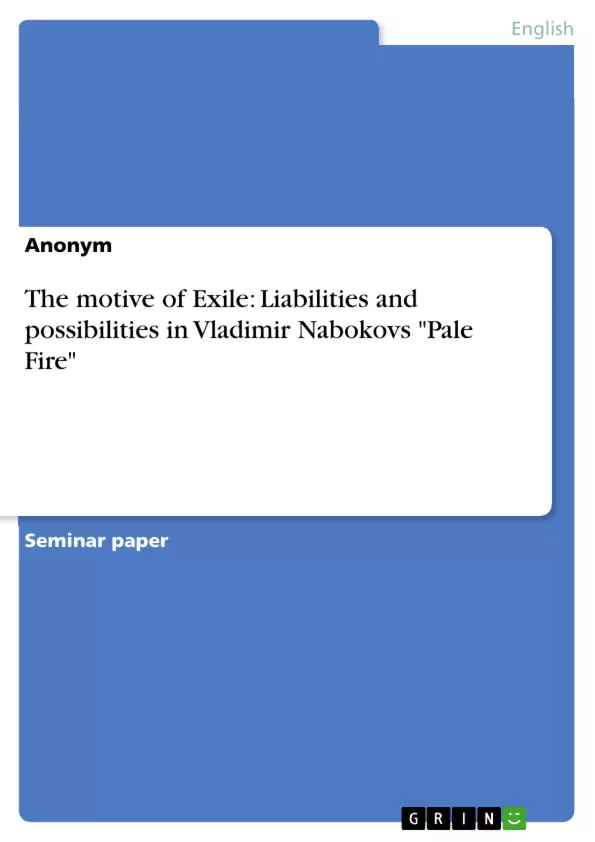Vladimir Nabokov once stated that he considered all literature as fiction, thus regarding fiction and reality as two separate spheres.1 He is right with this assumption when it comes to regard a piece of literature as art and not as a reflection of its author’s life, however, somehow every author leaves his fingerprints on his or her work. It is therefore very interesting to closely watch the various resemblances between Vladimir Nabokov and his novel's characters. Actually, Nabokov employs his own life as a source for his stories, for example is his passion for chess reflected in The Defense, as his love of butterflies results in their pervasive occurence in his books.
Inhaltsverzeichnis (Table of Contents)
- Introduction
- The motive of exile
- Conclusion
Zielsetzung und Themenschwerpunkte (Objectives and Key Themes)
This preview aims to provide a comprehensive overview of Vladimir Nabokov's Pale Fire, focusing on the theme of exile and its impact on the novel's characters and narrative. It analyzes how Nabokov uses the experiences of exile to explore both the potential losses and opportunities associated with displacement.
- The theme of exile as experienced by Nabokov and his characters.
- The duality of exile: loss and opportunity.
- The unreliable narrator and the blurring of reality and delusion.
- The portrayal of "Zembla" as a parallel to Nabokov's homeland.
- The exploration of the psychological effects of displacement.
Zusammenfassung der Kapitel (Chapter Summaries)
Introduction: This introductory section establishes the central premise of the work: exploring the multifaceted theme of exile in Vladimir Nabokov's novels, drawing parallels between Nabokov's own experiences as an expatriate and the lives of his fictional characters, particularly Charles Kinbote in Pale Fire. It highlights Nabokov's view of fiction and reality as distinct spheres while acknowledging the author's imprint on his work, using examples such as the recurring motif of butterflies reflecting Nabokov's personal passion. The introduction sets the stage for a deeper analysis of how the theme of exile is woven into Nabokov's narratives.
The motive of exile: This chapter delves into the complexities of exile, moving beyond the simplistic dictionary definition of forced or voluntary absence from one's homeland. It explores the profound psychological and social implications of being an expatriate, drawing upon Edward Said's perspective on the "unhealable rift" between the individual and their native place. The chapter contrasts the potential losses (culture, community, status) with the potential gains (bicultural awareness). It introduces Charles Kinbote from Pale Fire as a prime example, highlighting the similarities between fictional Zembla and Nabokov's native Russia and contrasting Kinbote's experience with other expatriate characters like Humbert Humbert. The chapter lays the foundation for analyzing Kinbote's delusional behavior as a potential consequence of his exile and loss.
Schlüsselwörter (Keywords)
Vladimir Nabokov, Pale Fire, exile, expatriate, unreliable narrator, delusion, Zembla, Russia, loss, opportunity, biculturalism, Edward Said, migration literature, psychological effects of displacement.
Vladimir Nabokov's Pale Fire: A Comprehensive Language Preview - FAQ
What is this document?
This is a comprehensive language preview of materials analyzing Vladimir Nabokov's novel, Pale Fire. It provides a table of contents, objectives and key themes, chapter summaries, and keywords, all focused on the theme of exile.
What are the main objectives of this preview?
The preview aims to give a thorough overview of Pale Fire, concentrating on the theme of exile and its effect on the novel's characters and narrative. It examines how Nabokov uses the experience of exile to explore both the potential losses and gains associated with displacement.
What are the key themes explored?
Key themes include: the experience of exile as lived by Nabokov and his characters; the duality of exile—loss and opportunity; the unreliable narrator and the blurring of reality and delusion; the portrayal of "Zembla" as a parallel to Nabokov's homeland; and the exploration of the psychological effects of displacement.
What is covered in the "Introduction" chapter summary?
The introduction sets up the central idea: exploring the multifaceted theme of exile in Nabokov's novels. It draws parallels between Nabokov's own experiences and his fictional characters, particularly Charles Kinbote in Pale Fire. It also highlights Nabokov's view of fiction and reality and uses examples like the recurring butterfly motif to show the author's influence.
What is discussed in the "The motive of exile" chapter summary?
This chapter delves into the complexities of exile beyond a simple definition. It explores the psychological and social implications of being an expatriate, using Edward Said's perspective. It contrasts potential losses (culture, community, status) with potential gains (bicultural awareness). Charles Kinbote is used as a prime example, comparing fictional Zembla to Nabokov's native Russia and contrasting Kinbote's experience with other expatriates like Humbert Humbert. The chapter links Kinbote's delusional behavior to his exile and loss.
What are the keywords associated with this analysis?
Keywords include: Vladimir Nabokov, Pale Fire, exile, expatriate, unreliable narrator, delusion, Zembla, Russia, loss, opportunity, biculturalism, Edward Said, migration literature, psychological effects of displacement.
What is the intended audience for this preview?
This preview is intended for academic use, facilitating the analysis of themes in a structured and professional manner.
What is the structure of the preview?
The preview is structured with a table of contents, a statement of objectives and key themes, chapter summaries, and a list of keywords.
- Citar trabajo
- Anonym (Autor), 2009, The motive of Exile: Liabilities and possibilities in Vladimir Nabokovs "Pale Fire", Múnich, GRIN Verlag, https://www.grin.com/document/171644



